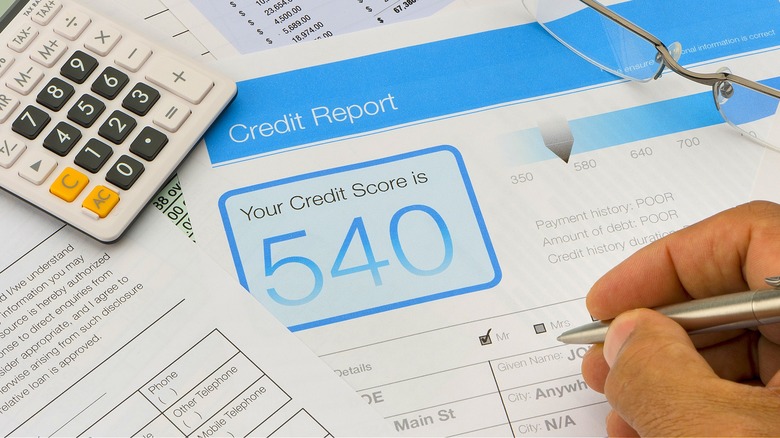Need To Ask A Family Member To Borrow Money? Here's How To Make It Less Awkward
Americans don't talk freely when it comes to money, even though a majority say that having open conversations about money is key to achieving financial freedom. In its 2023 money talks survey, the financial services company Empower found that 62% of Americans don't talk about money and 63% don't discuss it with their family. What's more, 52% said the topic of money wasn't discussed in their homes growing up. So, if you find yourself in a situation where you need to talk to your family about money — and ask them for help — but you're feeling awkward about broaching the subject, you're not alone.
However, it doesn't have to be so difficult. In times of need, turning to your family is often the best, most practical solution. Rather than take out a high-interest payday loan or max out your credit cards and further worsen your financial situation, borrowing from a family member won't come with fees, finance charges, or a request for repayment in a few weeks. Yes, it might be a little awkward to bring up, but getting past the awkwardness (as well as your pride) is a far better solution than going broke.
Reasons to borrow money from family
Though it will likely be an awkward conversation to begin at first, asking to borrow money from your family is most often your best option. Though being in a tight spot financially is the very reason why you save an emergency fund, not everyone can set aside money for one, and even if you do, it may not be enough. Rather than exhaust your funds and still be in a hole, asking your family for a loan can not only help you out of your financial troubles, but also not compound them with fees, high-interest rates, and repayment demands.
So long as you explain your situation and make it clear that this isn't a handout, the awkwardness should pass. And to make you feel less awkward, know that borrowing money from family isn't an uncommon solution in the United States. In fact, according to the Census Bureau's 2022 Household Pulse Survey, which received 63,769 responses (between March 30 and April 11), borrowing from family/friends occurs across the generations. Per the survey, 14% of millennial respondents said they borrowed from family and friends, while 11% of Generation X said the same and 8% of boomers.
Questions to ask before you ask
After weighing your options and coming to the conclusion that borrowing from your family is best, next comes asking a few questions of yourself. This'll help you prepare for your money talk, so when you do, you have all the numbers and answers. This will help ensure all parties are on the same page. The first question to ask would be, how much do you need to borrow? From a few hundred dollars to get your credit card accounts current to thousands of dollars for a downpayment on a new home, it's important you know how much you'll be asking for (for one, so you won't have to follow it up with another loan request).
Next, decide on who to ask. While this may seem like an obvious answer, you should consider the financial situation of the person or persons you're asking, too. Are you asking your parents, and are your parents retired? Will they need to draw on their retirement savings to help you? If you were to borrow from them, how fast could you repay them so that you don't end up putting them into a bad financial situation, too? Would asking a sibling be better? Further, consider your relationship to this person(s). Certainly, a strong relationship will make asking to borrow some money less awkward.
When you ask, explain what you've done so far
Whomever you do decide on asking, keep in mind that getting into further financial trouble can happen pretty quickly. From missing a payment on a credit card to making one of various mistakes that'll tank your credit score, awkwardly asking family for money to avoid such pitfalls is still the most sensible tack. If you choose not to ask them for help — and end up with even worse financial problems, your family may eventually need to help anyway, only now it will be for much more.
When you do sit down with your family to talk about your money problems, one way to make the conversation less awkward is to simply be upfront with what your situation is and what you've tried so far to get out of it. Be open to answering your family's questions, and don't get defensive; instead, present your numbers (i.e., how much you need to borrow, how long you'll need it, and a timeline for repayment) and demonstrate that you've thought this through and are turning to them because you trust them and need them.
Lay out your repayment plan
In a November 2020 survey by LendingTree, of more than 2,000 Americans, 53% of respondents said they had either borrowed or loaned money to a relative in the past year. Yet, to bring it back to the awkwardness of asking for help when it comes to finances, 31% of those surveyed said they'd rather go broke than ask for help from a family member or a friend.
Part of this resistance is likely because asking for help makes you vulnerable and you'll need to let your family in on your financial troubles, which you've likely kept hidden to this point. But to help get past the awkwardness, make sure you have a repayment plan prepared, too. When you present your money problem and request a loan from your family, also make clear that this isn't a handout: It's a loan, one you're determined to pay back.
When you present your proposed repayment schedule, do so with specifics and ask your family if this sounds okay to them. For example, if you need $6,000 more to make a 20% downpayment on a home, explain how you intend to pay it all back, including any interest you might want to add to it (and manage to get your family to agree to, too).
Create a promissory note for the loan
Finally, once you and your family have agreed on the loan, put the terms in writing. While this may also seem awkward, and perhaps impersonal, it's actually for the best for all parties, so that everyone is on the same page, and there's no confusion in the future (which could end up being bad for your relationship). In your contract, or promissory note, include the loan amount, how much you plan to pay back and when, as well as any other agreements, such as if you're paying interest. For example, for the $6,000 downpayment, the terms may be $500 a month for 12 months with no interest.
Even if the loan turns into a gift (not a handout), it's a good idea to get this in writing, too. Doing so will simply eliminate any confusion down the road. Having a promissory note, signed by all parties, is a great way to end the money talk; it might start out a bit awkwardly but it can end with everyone feeling good about the solution, one you arrived at together as a family.





